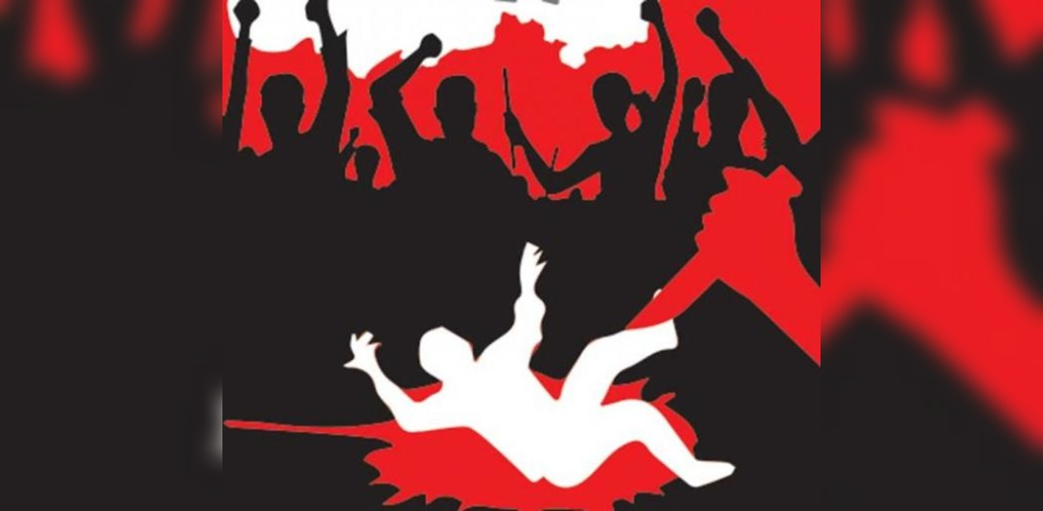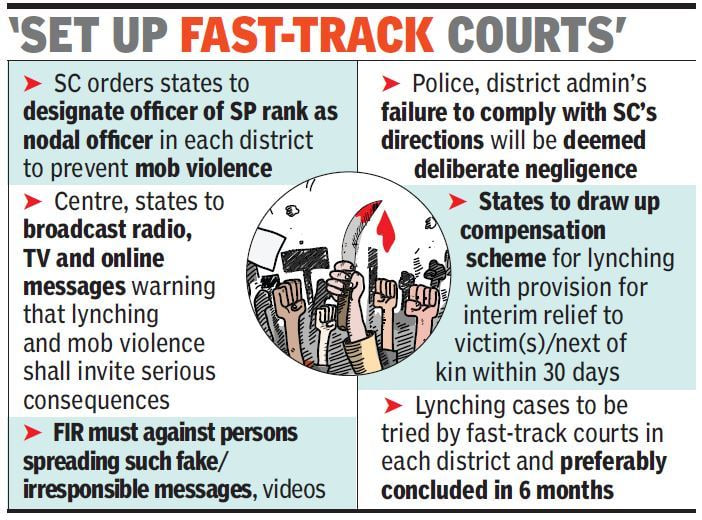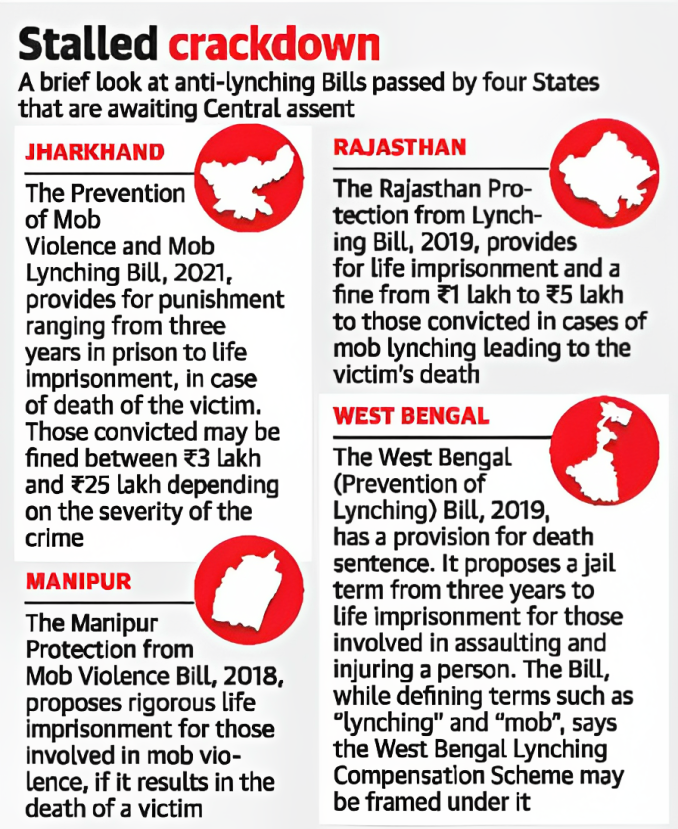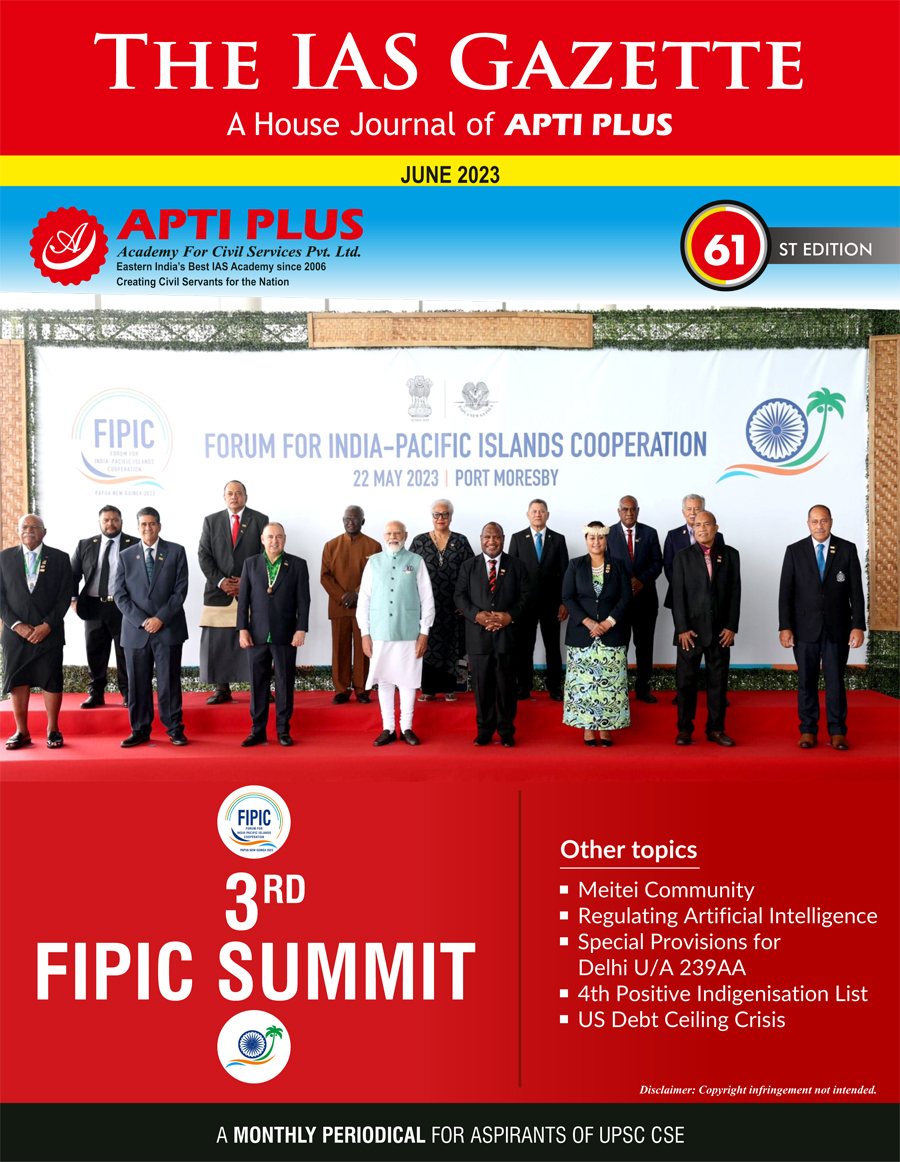
Copyright infringement not intended
Context: The Supreme Court of India has asked the Union Government and the State Governments to provide updates on the measures taken to prevent and punish mob violence and lynchings in the country.
Details
- The Supreme Court has ordered the governments to submit year-wise data, starting from 2018, on the number of complaints received, FIRs lodged and challans presented in courts related to such incidents.
- The court has expressed concern over the rising cases of mob violence and lynchings, which violate the fundamental rights of the victims and undermine the rule of law.
Mob lynching
About
- Mob lynching is a form of collective violence in which a group of people attacks and kills a person or a group of people, often based on their identity, beliefs, or actions. It is not a new phenomenon in India, but it has become more frequent and visible in recent years, especially with the rise of social media and fake news.
- Mob lynching has become a serious problem in India, where it has claimed hundreds of lives in recent years. The victims of mob lynching are mostly from marginalized communities, such as religious minorities, Dalits, Adivasis and women.
Some of the reasons behind mob lynching in India are:
Communal hatred and religious intolerance
- Many cases of mob lynching are motivated by communal hatred and religious intolerance, often fueled by rumours, fake news, or hate speech.
- Some of the victims are accused of cow slaughter, beef consumption, conversion, blasphemy, or love jihad, which are seen as offences against the majority faith. The perpetrators often claim to be protecting their religion or culture from external threats or influences.
- For example, in 2015, a man was lynched by a mob in Dadri, Uttar Pradesh, over allegations of cow slaughter and beef consumption. In 2017, a teenager was stabbed to death by a mob on a train in Haryana, after being accused of being a "beef-eater". In 2018, two men were lynched by a mob in Assam, over suspicion of being cow thieves.
Caste discrimination
- Caste is a system of social hierarchy that divides people into different groups based on their birth, occupation, and status. Caste discrimination is still prevalent in many parts of India, despite being outlawed by the constitution.
- Some cases of mob lynching are driven by caste prejudice or resentment, often targeting lower-caste people or those who challenge the caste order. The victims are often accused of violating caste norms, such as inter-caste marriage, land disputes, or social mobility.
- Dalits, who are at the bottom of the caste hierarchy, face violence and humiliation from the upper castes regularly. For example, in 2016, four Dalit men were flogged by a group of cow vigilantes in Una, Gujarat, for skinning a dead cow. In 2019, a Dalit man was beaten to death by an upper-caste mob in Rajasthan, for allegedly having an affair with an upper-caste woman.
Rumours and misinformation
- Another major reason for mob lynching is the spread of rumours and misinformation through social media platforms such as WhatsApp, Facebook, or Twitter. These rumours often create panic and fear among the masses, who then take the law into their own hands and attack anyone they suspect of being involved in crimes such as child abduction, organ trafficking, witchcraft, or terrorism. The victims are often innocent bystanders who happen to be at the wrong place at the wrong time.
Lack of effective law and order
- One of the main reasons for mob lynching is the lack of effective law and order in many parts of India. Many times, the police fail to prevent or stop mob violence, either due to negligence, complicity, or fear. Sometimes, the police arrest the victims instead of the perpetrators.
- The judicial system is slow in delivering justice to the victims and punishing the culprits. As a result, the mobs feel emboldened to take the law into their own hands and act with impunity.
- The police and the judiciary are often unable or unwilling to prevent or punish mob violence, either due to corruption, incompetence, or political pressure.
- The perpetrators often enjoy impunity or support from influential groups or leaders, while the victims and their families face harassment, intimidation, or denial of justice.
- The absence of effective law and order creates a sense of insecurity and frustration among the people, who then resort to vigilantism and mob justice.

Negative Impacts
- Mob lynching violates the human rights and dignity of the victims and their families, who often do not get justice or compensation for their losses.
- It creates a climate of fear and insecurity among the vulnerable groups, who face constant threats and harassment from the mobs.
- It undermines the rule of law and democracy, as the mobs take the law into their own hands and challenge the authority of the state and its institutions.
- It erodes the social fabric and harmony, as it fuels communal hatred and violence, and widens the gaps between different groups.
- It hampers economic development and progress, as it disrupts the normal functioning of society and affects the livelihoods and opportunities of many people.
Mob lynching is a grave challenge for India, which needs to be addressed urgently and effectively. The government, civil society, media and citizens have to work together to prevent and punish mob lynching, and to promote peace and tolerance among different communities.
Steps taken to curb the menace of mob lynching
Supreme Court
- The Supreme Court of India issued a set of guidelines in 2018 to deal with mob lynching and cow vigilantism. The guidelines include preventive, remedial, and punitive measures, such as identifying vulnerable areas, deploying police patrols, registering FIRs, ensuring speedy trials, providing compensation and protection to victims and witnesses, and imposing strict punishment on the perpetrators.

Ministry of Home Affairs
- The Ministry of Home Affairs issued an advisory in 2019 to all the states and union territories to implement the Supreme Court's guidelines and take effective action against mob lynching. The advisory also asked the states and union territories to designate a senior police officer as the nodal officer in each district to coordinate the police response and monitor the cases of mob lynching.
Anti-lynching laws
- Some states, such as Rajasthan, Manipur, West Bengal, and Madhya Pradesh, have enacted or proposed anti-lynching laws that define mob lynching as a specific offence and prescribe harsh penalties for it. These laws also provide for compensation and rehabilitation of the victims and their families, as well as accountability of the police and public officials for any negligence or failure in preventing or controlling mob lynching.

Civil society organizations
- Various civil society organizations, activists, media outlets, celebrities, and citizens have launched campaigns and initiatives to raise awareness and mobilize public opinion against mob lynching. Some examples are #NotInMyName, #StopLynchings, #NoPlaceForHate, #IndiaAgainstLynchTerror, etc. These campaigns aim to create a culture of tolerance and respect for diversity and to challenge the misinformation and propaganda that fuel mob violence.
Educational institutions
- Some educational institutions, such as the National Law School of India University (NLSIU), have introduced courses and workshops on mob lynching and human rights for their students and faculty. These courses aim to sensitize the participants about the causes, consequences, and legal aspects of mob lynching, and to equip them with the skills and knowledge to combat it.
Challenges
Lack of a clear definition
- Lack of a clear and comprehensive legal definition of mob lynching and its various forms and causes. This creates ambiguity and confusion in identifying, registering and prosecuting mob lynching cases and in providing relief and rehabilitation to the victims and their families.
Absence of a specific law
- Absence of a specific law to deal with mob lynching and to provide adequate protection and compensation to the victims and their families. The existing laws, such as the Indian Penal Code, the Code of Criminal Procedure and the Protection of Human Rights Act, are not sufficient to deal with the complexity and gravity of mob lynching incidents.
- There is a need for a separate law that defines mob lynching as a distinct offence, prescribes stringent punishment for the perpetrators and accomplices, ensures speedy justice for the victims and their families, and imposes accountability on the police and the administration for their failure to prevent or control mob lynching.
Inadequate implementation of existing laws and Guidelines
- Inadequate implementation and enforcement of existing laws and guidelines by the police and the judiciary, often due to political interference, communal bias or fear of reprisal from the mob. There have been many instances where the police have failed to register FIRs, conduct proper investigations, arrest the accused, or provide protection to the victims and witnesses.
- There have been cases where the judiciary has granted bail to the accused, delayed or dismissed trials, or given lenient sentences to the convicts. These factors undermine the credibility and effectiveness of the legal system and encourage impunity for mob lynching.
Weaknesses in the criminal justice system
- Weaknesses in the criminal justice system, such as delay in investigation, prosecution and trial, low conviction rate, lenient punishment and lack of witness protection. These factors deter the victims and their families from seeking justice and redressal and also discourage potential witnesses from coming forward or testifying against the accused. Moreover, these factors also fail to deter or reform the offenders and prevent them from repeating their crimes.
Spread of fake news, misinformation and hate speech
- Spread of fake news, misinformation and hate speech through social media and other platforms that incite violence and hatred among different groups. These platforms are often used by vested interests to spread rumours, propaganda and false information that create fear, suspicion and animosity among people belonging to different religions, castes, ethnicities or political affiliations.
- These platforms also facilitate the mobilization and coordination of mobs that carry out lynching attacks on innocent people based on false or unverified allegations.
Lack of awareness and education
- Lack of awareness and education among the public about the legal and moral implications of mob lynching and the need for communal harmony and tolerance. Many people are ignorant or indifferent about the rights and dignity of other human beings, especially those who are different from them in terms of religion, caste, ethnicity or political ideology.
- People are also unaware or unconcerned about the consequences of their actions on themselves, their families, their communities and their country.
- People do not realize that mob lynching is not only a crime against humanity but also a self-destructive act that erodes the social fabric and undermines the democratic values of the nation.
Failure of Stakeholders
- Failure of civil society, media and other stakeholders to play a proactive role in preventing and reporting mob lynching incidents and in providing support and solidarity to the victims.
- Civil society organizations, human rights groups, NGOs, religious leaders, intellectuals, celebrities and other influential personalities have a responsibility to raise awareness among the public about the evils of mob lynching and to mobilize them against it.
- They should also monitor and report mob lynching incidents in an objective and timely manner, expose the culprits and their motives, demand action from the authorities, and provide legal aid, medical assistance, psychological counselling and financial support to the victims and their families.
Some of the possible ways forward
Strengthening the legal framework and ensuring its strict implementation
- Strengthening the existing laws and guidelines, such as the Supreme Court's directions in the Tehseen Poonawalla case (2018) that mandates preventive, remedial and punitive measures by the state authorities to curb mob lynching.
- There is a need to enact a specific law against mob lynching at the central and state levels, with adequate provisions for prevention, investigation, prosecution, compensation, and rehabilitation. Such a law would send a strong message that mob lynching is not tolerated in a democratic society and that the perpetrators will be held accountable for their actions.
Enhancing the capacity and accountability of the police and the judiciary
- The police should act promptly and impartially to prevent mob violence, register FIRs, arrest the perpetrators, and provide protection to the victims and witnesses. The judiciary should expedite the trials and deliver justice to the victims without delay or bias. The police and judicial officers who are negligent or complicit in mob lynching should be held accountable and punished.
- Enhancing the capacity and accountability of the police and the judiciary to deal with mob lynching cases effectively and impartially, without any fear or favour. This requires improving the training, resources, coordination and supervision of law enforcement agencies, as well as ensuring their independence and integrity. It also requires expediting the trials and appeals of mob lynching cases and delivering justice to the victims and their families.
Promoting awareness and education among the masses
- The government, civil society, media, and educational institutions should launch campaigns and programs to educate the people about the ill effects of mob lynching, the legal consequences of participating in such acts, and the importance of respecting diversity and tolerance. They should also counter the false narratives and propaganda that incite hatred and violence against certain groups or individuals.
- Curbing the spread of fake news, misinformation and hate speech through strict regulation of social media and other platforms, as well as through awareness campaigns and fact-checking initiatives. This involves enforcing the existing laws and norms against inciting violence and hatred, monitoring and removing objectionable content, verifying and debunking false claims, and educating and empowering the users to be responsible and critical consumers of information.
Fostering dialogue and reconciliation among different communities
- The government, religious leaders, social activists, and other stakeholders should initiate and facilitate dialogue and interaction among different communities to build trust and understanding. They should also work together to resolve conflicts and grievances peacefully and democratically. They should also promote a culture of non-violence and human rights among the people.
- Encouraging civil society, media and other stakeholders to act as watchdogs, whistle-blowers and advocates for preventing and combating mob lynching and for supporting and empowering the victims. This implies creating networks and platforms for reporting, documenting and exposing mob lynching incidents, mobilizing public opinion and pressure against such violence, providing legal aid and counselling to the victims, and demanding accountability from the authorities.

Conclusion
- Mob lynching in India is a serious issue that has claimed many lives and violated human rights. Some steps taken by the government and civil society to prevent mob lynching include enacting laws, creating helplines, raising awareness and promoting communal harmony. However, there are still many challenges in implementing these measures, such as lack of accountability, political interference, social media rumours and communal hatred. The way forward is to strengthen the rule of law, ensure justice for the victims, educate the masses and foster a culture of tolerance and peace.
Must-Read Articles:
Lynching: https://www.iasgyan.in/daily-current-affairs/lynching
|
PRACTICE QUESTION
Q. Mob lynching is a serious social problem in India, where people are killed or injured by violent mobs based on rumours, prejudices or personal enmity. What are the main causes and consequences of this phenomenon? How have the government and civil society responded to prevent and punish mob lynching? What are the possible ways to address the root causes of mob lynching and promote a culture of tolerance and respect for human rights in India?
|
https://epaper.thehindu.com/ccidist-ws/th/th_delhi/issues/43154/OPS/GS7BFFQ7G.1.png?cropFromPage=true













